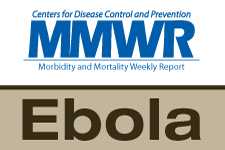Frequently Asked Questions on Screening for Ebola Virus Disease for Providers, Healthcare Facilities and Health Departments
Do healthcare providers still need to screen patients for Ebola virus disease in the U.S.?
Given that the transmission and occurrence of Ebola virus and occurrence of Ebola virus disease in West Africa has been greatly reduced, healthcare facilities should adjust screening practices for acutely ill patients and no longer need to screen patients specifically for Ebola virus disease. Healthcare facilities should continue to obtain a travel history in triage before completing full patient evaluation so that infection control precautions and patient placement can begin promptly when appropriate. Facilities and providers can stay up-to-date on active travel notices by consulting CDC’s Travelers’ Health website.
Signs and symptoms associated with Ebola virus disease are non-specific and are similar to many other common causes of febrile illness in returning travelers. Acutely ill patients who have been in Guinea, Liberia, or Sierra Leone during the previous 21 days should be assessed for Ebola virus exposure and other conditions listed on the CDC Traveler’s Health website for West Africa (e.g., Lassa fever, yellow fever, other illnesses), and specifically for malaria, which is the most likely diagnosis in a febrile traveler returning from Guinea, Sierra Leone or Liberia. Important risks for exposures to Ebola virus include: contact with blood or bodily fluids of acutely ill persons with suspected or confirmed Ebola virus disease, such as providing care in a home or healthcare setting; participation in funeral rituals, including preparation of bodies for burial or touching a corpse at a traditional burial ceremony; working in a laboratory where human specimens are handled; handling wild animals or carcasses that may be infected with Ebola virus (primates, fruit bats, duikers); and sexual history, specifically if the patient has had contact with the semen from a man who has recovered from Ebola virus disease (for example, oral, vaginal, or anal sex).
While we expect sporadic cases might occur in West Africa, the three countries have proven they are prepared to handle any new cases. We have seen flare-ups in Liberia and Sierra Leone, which have been quickly detected and controlled.
What healthcare screening questions should be asked of recent travelers from countries with former widespread transmission of Ebola virus who have no signs or symptoms of Ebola virus disease?
No specific enhanced screening is required for travelers from Guinea, Sierra Leone, or Liberia. Travelers returning from West Africa should be treated similarly to any other patients who have recently traveled internationally.
What screening questions should be asked during intake for ill persons at healthcare systems and their various departments, emergency departments, and urgent care facilities?
Because of the constant risk for travel-associated diseases (such as malaria, dengue, vaccine-preventable diseases) and emerging pathogens (MERS-CoV, chikungunya, Zika virus, etc.), a travel history should remain part of routine patient evaluation, including during entry to the facility. Obtaining a travel history is an important part of ensuring rapid triage and prompt isolation of patients and/or starting infection control measures to minimize the spread of infectious diseases to other patients or healthcare providers (such as placing a facemask over the patient’s nose and mouth for those with respiratory illness). Questions of the patient should be guided by the type and background of the patients served by the facility. In addition to the healthcare provider asking questions of the patient, facilities should consider posting visual alerts (signs, posters) at the entrance and in strategic places (waiting areas, elevators, cafeterias) to provide patients with clear instructions, in appropriate languages, about infection control precautions and the importance of notifying healthcare providers of their travel history.
What is the current hospital management recommendation for evaluating an ill traveler from West Africa (Guinea, Liberia, or Sierra Leone)?
There are currently no countries with widespread transmission of Ebola virus. During the 2014 Ebola outbreak, CDC recommended that acutely ill travelers from a country with widespread Ebola virus transmission be managed with specific infection prevention and control precautions until Ebola virus infection was ruled out or an alternate diagnosis was established. CDC’s current recommendations for acutely ill travelers from Guinea, Liberia or Sierra Leone are to conduct a risk assessment, place the patient in a private room with a bathroom until the risk assessment is completed, and follow infection control protocols and diagnostic and treatment procedures based on symptom presentation. Hospitals, providers, and facilities should review public information and educational materials regarding Ebola screening procedures (https://www.cdc.gov/vhf/ebola/healthcare-us/index.html).
Do travelers from Guinea, Sierra Leone, and Liberia still need to self-observe for signs and symptoms of illness for 21 days after leaving these countries?
Yes. CDC recommends that travelers from these countries continue to self-observe for 21 days after leaving these countries. If symptoms develop during the 21 days, travelers should seek medical attention and inform their healthcare provider about their travel history. The healthcare provider should notify the local health department, but should not delay evaluation and treatment.
If a traveler has fever, vomiting, or diarrhea, but has not been exposed to Ebola virus, can Ebola virus disease be eliminated from the differential diagnoses?*
Healthcare providers should conduct a thorough travel and health history for all acutely ill patients whose clinical presentation suggests a communicable disease, including vaccination history and prophylaxis compliance for infectious diseases such as malaria, when relevant. Following the travel and health history, if it is clear that there has been no exposure to Ebola virus, Ebola virus disease can be eliminated from the differential diagnosis. Diagnostic testing** and differential diagnosis should focus on those conditions consistent with the patient’s signs and symptoms, with special consideration of:
- Acute febrile illnesses. These can manifest with or without localizing signs or symptoms with acute fever [defined as ≥ 100.4 degrees Fahrenheit, constantly elevated temperature or intermittent fever, subjective fever, and/or chills). Because fever among patients can be the result of viral, bacterial, fungal, parasitic, or non-infectious causes, appropriate tests for these causes should be used to establish an underlying diagnosis.
- Acute upper and lower tract respiratory illnesses. These can manifest with or without fever, and with symptoms including sneezing, nasal congestion or stuffiness, nasal discharge, sore throat, hoarseness, eye burning or tearing, cough, malaise, muscle aches, and headache. Because the common cold, sinusitis, pharyngitis, bronchitis, and pneumonia can be caused by bacterial or viral infections, appropriate tests for these conditions and clinical judgement should be used if needed to establish a diagnosis and whether treatment is indicated.
- Acute gastrointestinal (GI) illnesses. These can manifest with or without fever, and with symptoms including diarrhea, nausea, vomiting, abdominal pain, abdominal cramps, headaches, and rash. Because acute GI illness in the returning traveler may be due to enteric pathogens, hydration and empiric treatment should be considered, taking into account travel-associated etiologies. GI symptoms may also be associated with respiratory or systemic infections.
*Note: Testing for EVD is still available in the U.S. and if determined testing is needed, please reach out to CDC and your local/state health department for approval and coordination.
**Note: It may be helpful to perform rapid diagnostic tests for malaria, influenza, respiratory, and gastrointestinal pathogens for evaluating an ill traveler depending upon the history, signs, and symptoms. Proper interpretation of test results is needed because these rapid tests may not have the sensitivity or specificity necessary to rule out a pathogen.
- Page last reviewed: March 17, 2016
- Page last updated: March 17, 2016
- Content source:




 ShareCompartir
ShareCompartir